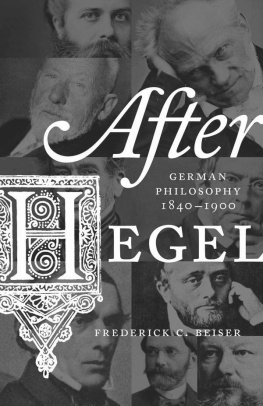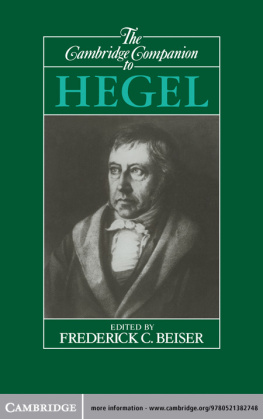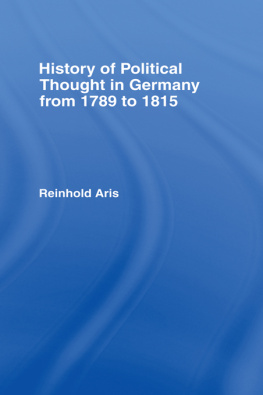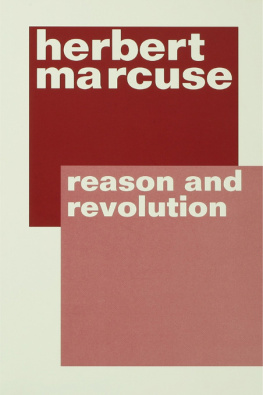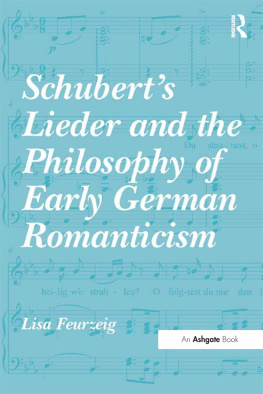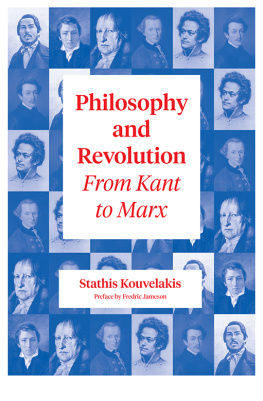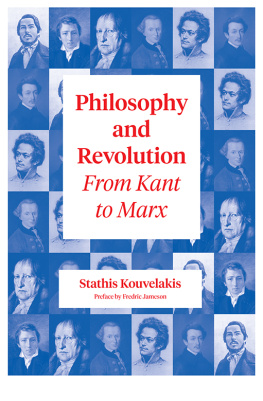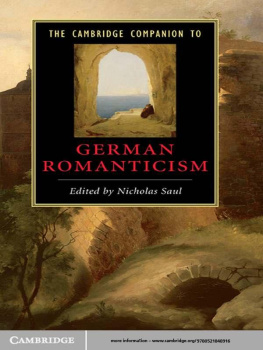Frederick C. Beiser
This book is printed on acid-free paper, and its binding materials have been chosen for strength and durability.
Enlightenment, revolution, and romanticism: the genesis of modern German political thought, 1790-1800 / Frederick C. Beiser.
p. cm.
Includes bibliographical references and index.
1. Germany--Politics and government--1740-1806. 2. Liberalism-Germany. 3. Romanticism--Germany. 4. Conservatism--Germany.
5. Philosophy, German-- 18th century. I. Title.
For H.
PREFACE
If we wish to study the origins of modern German political thought, the 1790s deserve our closest attention. The reaction to the French Revolution, which took place during this decade, led to the formation of three antithetical political traditions in Germany: liberalism, conservatism, and romanticism. Each of these traditions has played a central role in the development of modern German political thought in the nineteenth and twentieth centuries.
The task of this book is to determine the genesis and context of these traditions and to provide an analysis of their fundamental political ideals. It gives a survey of the major political thinkers and movements of the 1790s. Each chapter considers one or more of the central figures of this decade, the genesis of their political theory, their reaction to the French Revolution, and the importance of politics for their thought in general.
By concentrating on a single formative decade, I hope to give a more thorough account of these political traditions than has been possible with broader surveys. The study of any important historical period requires what Fritz Valjavec has called "Mut zum Detail." Only by focusing in depth on individual thinkers can we escape superficial generalizations and clichs.
A new study of the 1790s requires, I hope, little apology. There has not been any thorough study of this decade in English. The only major study of German political theory after the French Revolution is Reinhold Aris's History of Political Thought in Germany, 1789-1815 ( London, 1936), but this work is marred by prejudices, is very superficial philosophically, and is out of date. Klaus Epstein's Genesis of German Conservatism ( Princeton, 1966), while crucial for an understanding of this period, covers only some of the more important conservative thinkers. G. P. Gooch's Germany and the French Revolution ( London, 1920), although a useful survey of the various reactions to the French Revolution, provides only a superficial account of the political theories. George Kelly's brilliant study of the origins of Hegelianism, Idealism, Politics, and History ( Cambridge, 1969), has a much too narrow approach to its subject, focusing on a few major philosophers. He sees only the cloud-covered peaks, ignoring the whole
-vii-
topography of the land below. As a result, Kelly drastically exaggerates the significance of Rousseau at the expense of the more influential Montesquieu.
This book counters two current opinions. The first is the still prevalent view that German thought throughout the eighteenth century, and even during the French Revolution, was apolitical. This view, first expounded by Madame de Stal in her De l'Allemagne ( 1806), has gained wide acceptance since its propagation by Heine, Marx, and Engels. Against this view I have attempted to show the political purpose of most German philosophy in the 1790s. Although I have focused upon the 1790s, a decade when the influence of politics is most conspicuous, I have not limited myself to that period. Whenever possible I have also examined a philosopher's intellectual development in the preceding decades. Even then, I argue, we find that German philosophy was politically motivated. Hence its political dimension cannot be limited to the revolutionary decade alone.
The second opinion is the belief common among analytic philosophers that the essential interest and value of the German philosophical tradition lies in its arguments, the chains of reasoning that can be reconstructed from a close reading of a few selected texts. This narrowly analytical approach to the history of philosophy, if pushed to extremes and regarded as the only worthy one, ultimately emasculates its subject. The history of philosophy is much more than a set of arguments. It also consists of moral, political, and religious values, ends, and ideals. We can understand the history of philosophy only if we consider the purpose of argument, the values, ends, and ideals that lead a philosopher to construct an argument in the first place.
Both of these opinions have blinded us to the underlying political values and ideals of German thought in the late eighteenth century. The central thesis of this work is that German philosophy in this period--whether it concerns epistemology, metaphysics, ethics, or aesthetics--was dominated and motivated by political ends. Here I use the word "political" in its normal sense of anything concerned with the government of human beings.
The subject matter of this book is not, therefore, German political thought in any narrow sense. My proper subject is German philosophy in general in the 1790s. Since German philosophy in the 1790s is so profoundly politicized, however, any study of it inevitably becomes a study of German political thought.
This book continues my study of German philosophy in the 1780s, The Fate of Reason: German Philosophy from Kant to Fichte ( Cambridge, Massachusetts, 1987). These two books together are meant to survey German philosophy in its most formative modern period, from the publication of Kritik der reinen Vernunft in 1781 to the dawn of the nineteenth century.
In working on this book I have incurred many debts of gratitude, both to individuals and to institutions. I am especially grateful to the following
-viii-
people for their encouragement or reading of earlier drafts: Christiane Goldmann, Paul Guyer, Henry Harris, Michael Morgan, Susan Neimann, Fania Oz-Salzberger, James Schmidt, Harriet Strachan, Michael Theunissen, and Kenneth Westphal. I am also grateful for the generous assistance provided by the staffs of several libraries: the British Library, London; the University Library of the Free University of Berlin; the University Library of the University of Gttingen; and the Prussian State Library, Berlin. The book was written from 1988 to 1990 in Berlin and London; the final draft was prepared in the spring of 1991 in Bloomington, Indiana. My first two years of research were generously supported by the Alexander von Humboldt Stiftung, Bonn.
-ix-
[This page intentionally left blank.] | -x- |
|
CONTENTS | The Politicization of German Thought in the 1790s |
| | The Myth of the Apolitical German |
|
|
|
|


